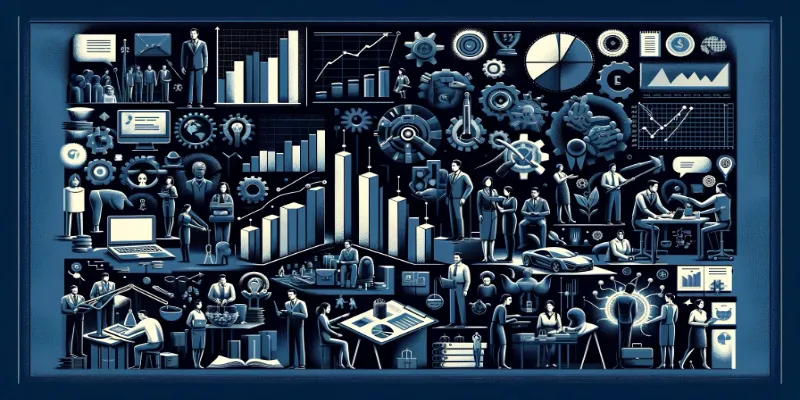
Mexico's labor market is experiencing a dynamic transformation, shaped by several internal and external factors that are influencing the country's economic and social fabric. These changes offer a window into the complexities and potential of Mexico as a hub for international business and local development. This blog post aims to provide a comprehensive overview of the current trends and challenges in Mexico's labor landscape.
Evolution and Challenges of the Mexican Labor Market: A Comprehensive Overview
Comprehensive Overview The Mexican labor market is undergoing a dynamic transformation.Let's delve into the various facets shaping this transformation.
1. Educational Advancements
One of the most significant shifts in the Mexican labor market is the increasing educational attainment of its workforce. Traditionally viewed as largely unskilled, the Mexican labor force is debunking this stereotype with rising high school, college, and trade school graduation rates. Fields like engineering, administration, management, business, and accounting are seeing the highest number of graduates, pointing towards a workforce that is more educated and skilled than ever before. This evolution not only challenges the old perceptions but also opens up new avenues for industries reliant on specialized skills.
2. The Rise of Labor Unions and Collective Bargaining
Labor unions in Mexico are gaining strength, marking a shift towards improved worker protections and more substantial collective bargaining agreements. This trend benefits workers by providing them with a more pronounced voice regarding their employment conditions. However, it also necessitates employers or manufacturers in New Mexico to adopt more flexible and responsive approaches in their hiring, compensation, and retention strategies. This balancing act between worker rights and business interests highlights the evolving power dynamics within the Mexican workplace.
3. Regulatory Reforms and Telework
Regulatory changes are an indicator of Mexico's labor landscape, with the government actively revising labor laws to reflect the changing times. Notable among these reforms is the Official Standard NOM-037-STPS-2023, focusing on telework conditions. This standard sets out the obligations for employers and employees in teleworking arrangements, ensuring safety and health at the remote workplace. These reforms are indicative of Mexico's commitment to modernizing its labor laws and adapting to new work modalities.
4. Impact of International Trade Agreements
Mexico's labor market is significantly influenced by its participation in international trade agreements, such as the United States-Mexico-Canada Agreement (USMCA). These agreements have redefined labor standards and expectations for Mexican workers, particularly in industries that are heavily involved in export to North America. While these agreements aim to strengthen labor rights and improve working conditions, they also necessitate adjustments from businesses to comply with higher labor standards, affecting competitiveness and operational strategies.Must read How To Start A Manufacturing Business In 2024.
5. Technology and Automation
The advent of technology and automation presents both opportunities and challenges for the Mexican labor market. On one hand, automation can lead to job displacement, especially in sectors that are highly susceptible to automation such as manufacturing. On the other hand, it offers the opportunity to upskill the workforce and move towards more value-added activities. The key challenge for Mexico is to balance the implementation of automation technologies with the development of educational and training programs that prepare workers for the jobs of the future.
6. Labor Migration
Labor migration is a significant issue for Mexico, both in terms of emigration to countries like the United States and the immigration of workers from Central America. Emigration often results in a "brain drain," where skilled workers leave the country for better opportunities abroad, impacting various sectors, especially healthcare and engineering. Conversely, Mexico faces challenges in integrating immigrant workers into its labor market, ensuring that their rights are protected while also addressing the social and economic implications of increased immigration.
7. Environmental Sustainability and Labor
Another aspect gaining attention is the intersection of labor and environmental sustainability. As Mexico invests in green technologies and industries, such as renewable energy, there's a growing need for skilled workers in these fields. This shift towards sustainability can create new job opportunities and necessitate further workforce development to meet the demands of environmentally friendly industries.
8. Economic Influences and Challenges
Mexico's economic policies, particularly those related to labor rates and minimum wages, are also reshaping the labor market. Adjustments aimed at improving living standards for workers are influencing business decisions, affecting investment, expansion, and location choices for manufacturing and other industries. These economic factors underscore the importance of staying abreast of policy changes and understanding their implications for the business environment.
Navigating the Future
The current state of labor in Mexico presents a mix of opportunities and challenges. For businesses, navigating this landscape requires a deep understanding of the trends shaping the labor market, from educational advancements and labor union dynamics to regulatory changes and economic policies. Staying informed and adaptable will be key to leveraging Mexico's strategic position in the global market.
As Mexico continues to evolve, its labor market serves as a reflection of the country's broader economic and social changes. By embracing these trends and addressing the associated challenges, businesses can position themselves to thrive in this vibrant and complex environment.
Embracing Change: SIXM's Vision for a Thriving Future in Mexico's Evolving Labor Market
As the Mexican labor market evolves amidst these varied forces, businesses and workers alike must adapt to the changing landscape with resilience and strategic foresight. At SIXM, we are committed to navigating these complexities with innovative solutions and expert insights, ensuring that our clients and partners are well-equipped to thrive in this new era of labor dynamics. Together, we embrace the challenges and opportunities ahead, forging a path toward sustainable growth and enhanced workforce empowerment.
Reference:
NOM-037-STPS-2023 TELEWORKING.
Labor Unions - Statistics & Facts.

